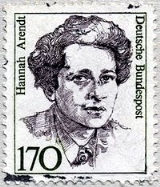
American
political theorist. She has often been described as a philosopher, although she refused that label on the grounds that philosophy is concerned with "man in the singular." She described herself instead as a political theorist because her work centers on the fact that "men, not Man, live on the earth and inhabit the world". Arendt's work deals with the nature of power
, and the subjects of politics
, authority
, and totalitarianism
.
Arendt was born into a family of secular German Jews in the city of Linden (now part of Hanover
), and grew up in Königsberg
(the birthplace of Prussian philosopher Immanuel Kant
, in 1946 renamed as Kaliningrad and annexed to the Soviet Union
), and Berlin
.
At the University of Marburg, she studied philosophy with Martin Heidegger
, with whom, as related by her only German-Jewish classmate Hans Jonas
, she embarked on a long, stormy and romantic relationship for which she was later criticized because of Heidegger's support for the Nazi
party while he was rector of Freiburg University
.
In the wake of one of their breakups, Arendt moved to Heidelberg
, where she wrote her dissertation on the concept of love in the thought of Saint Augustine
, under the existentialist philosopher-psychologist Karl Jaspers
.
The concentration camps, by making death itself anonymous (making it impossible to find out whether a prisoner is dead or alive), robbed death of its meaning as the end of a fulfilled life. In a sense they took away the individual’s own death, proving that henceforth nothing belonged to him and he belonged to no one. His death merely set a seal on the fact that he had never existed.![]()
Man cannot be free if he does not know that he is subject to necessity, because his freedom is always won in his never wholly successful attempts to liberate himself from necessity.![]()
What makes it so plausible to assume that hypocrisy is the vice of vices is that integrity can indeed exist under the cover of all other vices except this one. Only crime and the criminal, it is true, confront us with the perplexity of radical evil; but only the hypocrite is really rotten to the core. ![]()
Political questions are far too serious to be left to the politicians.![]()
The most radical revolutionary will become a conservative the day after the revolution.![]()
The sad truth is that most evil is done by people who never make up their minds to be good or evil. ![]()
I've begun so late, really only in recent years, to truly love the world... Out of gratitude, I want to call my book [The Human Condition] on political theories Amor Mundi.![]()

